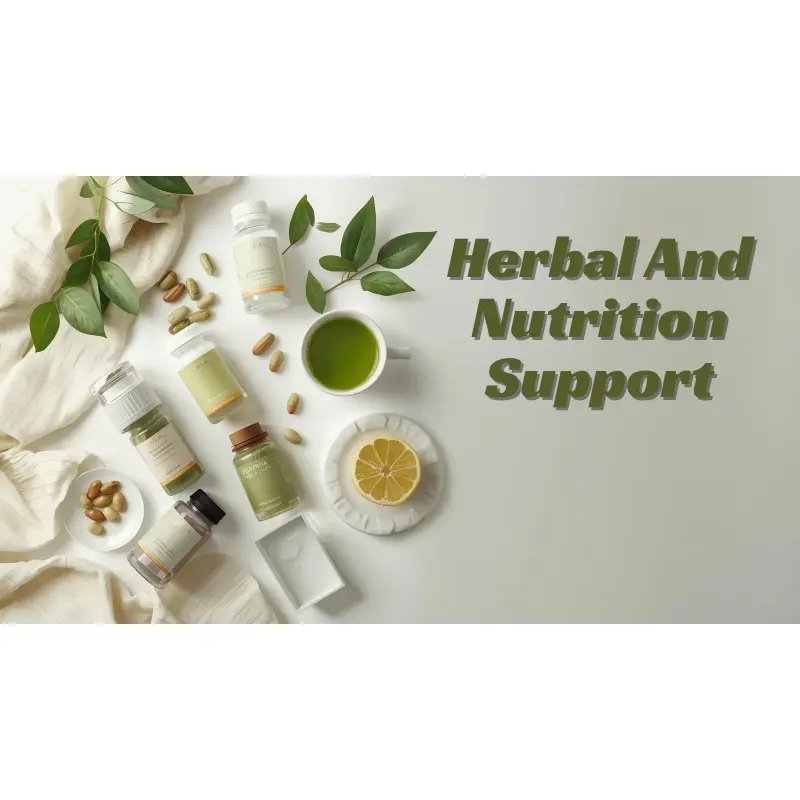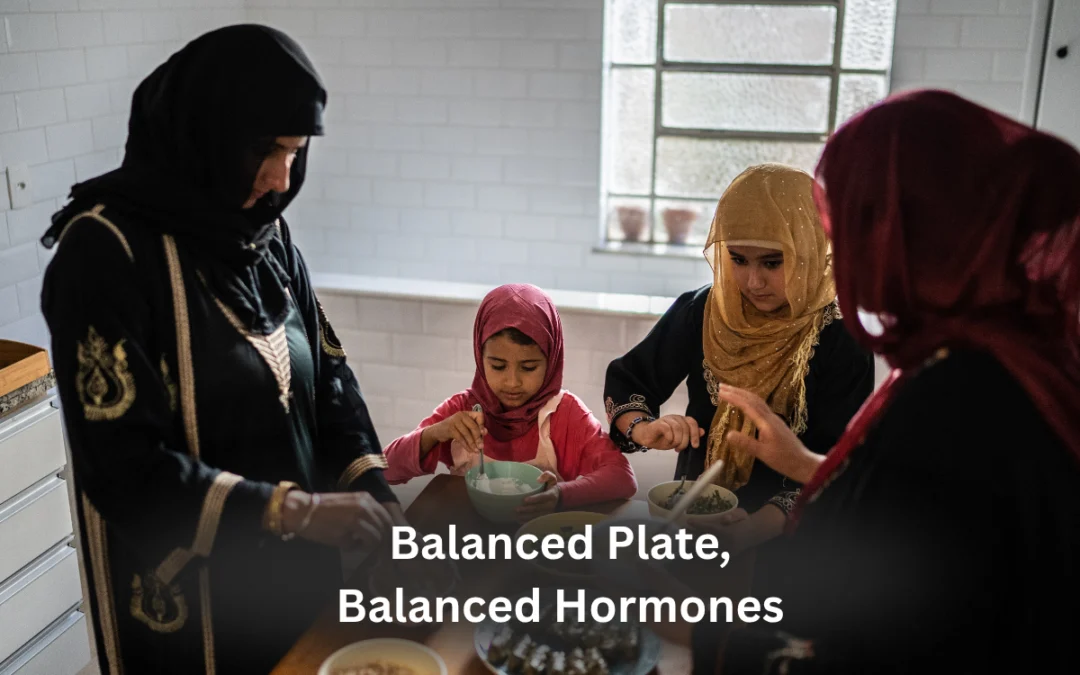Living with PCOS can feel overwhelming, especially when you’re trying to follow your faith and care for your health at the same time. The good news is that you can find balance with the right nutrition and mindset. This blog on PCOS diet tips for Muslim women will help you discover how to manage your hormones through food while staying true to Islamic values. From halal-friendly meals to fasting guidance, every step connects your wellness journey to your spiritual one. Let’s explore how your diet, guided by both science and faith, can help you take charge of your body and feel better every day.
Understanding PCOS and Why Diet Matters
Polycystic Ovary Syndrome (PCOS) is a hormonal condition that affects many women worldwide. It causes irregular periods, acne, unwanted hair growth, and weight gain due to hormonal imbalances. What many don’t realize is that diet plays a huge role in managing these symptoms. A balanced PCOS diet for Muslim women can help stabilize blood sugar levels, reduce insulin resistance, and improve fertility naturally. Understanding how your body reacts to food is the first step toward healing.
When you eat foods rich in nutrients and low in sugar, your body begins to reset its hormones. Avoiding processed meals and eating more whole foods supports your energy and mood. Pairing your meals with regular physical activity and stress control can make a big difference. Remember, PCOS is not just about medication food is your most powerful tool. Through a faith guided approach, you can build a diet that supports both health and spirituality.
The Connection Between Faith, Food, and PCOS
Islam encourages moderation, mindfulness, and gratitude in eating. The Qur’an teaches us to eat what is halal and wholesome principles that naturally support a PCOS-friendly lifestyle. PCOS diet tips for Muslim women often include eating fresh foods, avoiding waste, and staying mindful during meals. This spiritual connection transforms eating into an act of worship and self-care. Your faith can truly guide your healing journey.
During Ramadan or voluntary fasts, Muslim women with PCOS should plan meals carefully. Eating balanced suhoor and iftar helps keep blood sugar steady and reduces hormonal stress. Include slow-digesting carbs, lean proteins, and healthy fats to stay full longer. Hydrate well and avoid sugary drinks or heavy fried items. With a little planning, fasting can remain both spiritually uplifting and physically manageable.
Best Foods for Managing PCOS
The right foods can help reduce inflammation and balance hormones naturally. For a balanced PCOS diet for Muslim women, focus on foods that nourish and heal from within. Include low-GI carbohydrates like oats, brown rice, and quinoa to keep blood sugar stable. Add lean proteins such as fish, eggs, or lentils for muscle and energy. Healthy fats from olive oil, nuts, and seeds also play a key role in hormone production.
Here’s a quick PCOS-friendly grocery list:
- Whole grains: quinoa, oats, barley
- Proteins: chicken, fish, eggs, lentils
- Healthy fats: olive oil, almonds, chia seeds
- Fruits: berries, apples, pomegranates
- Veggies: spinach, kale, broccoli
Drinking plenty of water is also crucial to flush toxins and aid digestion. Limit sugary beverages, and choose herbal teas instead. These small, consistent choices bring big results over time. Remember, healing with food is a daily act of self-love and faith.
Foods to Limit or Avoid with PCOS
To balance hormones, it’s important to know what to avoid. Processed foods, sugary snacks, and refined carbs can worsen PCOS symptoms. They increase insulin resistance, making it harder for your body to regulate hormones. Caffeine, soft drinks, and too much dairy can also trigger bloating and acne. For the best results, create an eating plan that’s clean, halal, and low in processed sugar.
Avoid or limit these foods:
| Food Type | Examples |
| Sugary foods | Cakes, candy, soft drinks |
| Processed carbs | White bread, pasta, pastries |
| Fried foods | Fast food, deep-fried snacks |
| Dairy (in excess) | Cheese, cream, butter |
| Caffeine & soda | Coffee, cola, energy drinks |
Staying away from these triggers helps your body regain its natural rhythm. Replace them with wholesome meals that fill you with lasting energy. Over time, your skin clears, your periods normalize, and your mood improves. These are the true rewards of discipline and mindful eating.

Herbal and Nutritional Support for PCOS
Nature offers many healing options that can complement your PCOS diet tips for Muslim women. Herbs like spearmint, cinnamon, and fenugreek help lower androgens and support better insulin balance. Adding them to tea or meals can bring gentle, natural relief. Key nutrients such as vitamin D, B12, zinc, and magnesium are also vital for hormone health. You can find these in fish, eggs, leafy greens, and supplements if needed.
Before adding supplements, always consult a doctor or nutritionist familiar with PCOS. Some herbal remedies may interact with medication or fasting routines. A professional can guide you on safe doses that match your needs. Always choose halal-certified supplements for faith alignment. This holistic approach ensures both physical and spiritual harmony in your healing journey.

Sample Faith-Friendly PCOS Meal Plan
Here’s a simple meal plan that fits both your health and faith needs:
| Meal | Example |
| Suhoor / Breakfast | Oats with chia seeds, nuts, and berries |
| Lunch | Grilled chicken with quinoa and steamed vegetables |
| Snack | Apple slices with almond butter |
| Dinner | Baked salmon with brown rice and spinach |
| Hydration | 6–8 glasses of water, green tea, or mint tea |
This plan keeps your energy stable throughout the day and prevents sugar crashes. You can adjust portion sizes based on your activity level and fasting schedule. Remember to eat slowly and with gratitude mindful eating helps you feel satisfied sooner. Over time, your body learns to listen to hunger cues naturally. This is one of the most powerful steps toward sustainable PCOS management.
Lifestyle and Mindful Living Tips
Diet alone isn’t enough lifestyle changes play a huge role too. Stress increases cortisol, which can worsen PCOS symptoms. Try incorporating prayer, deep breathing, or journaling into your routine. Regular physical activity like walking, yoga, or light exercise supports hormone balance and weight control. Quality sleep (7–8 hours) helps your body reset every night.
Avoid chasing quick results through fad diets. They often lead to disappointment and nutrient loss. Focus on long-term habits you can sustain with joy and faith. Be patient your healing is a journey, not a race. With time, you’ll see both your health and spiritual strength grow together.
When to Seek Professional Help
Even with the best PCOS diet for Muslim women, sometimes professional guidance is needed. If your symptoms persist or worsen, consult a gynecologist or endocrinologist. They can run hormonal tests and suggest treatments like supplements, medications, or fertility plans. Some clinics now specialize in faith-based wellness, offering halal dietary counseling. It’s worth finding a doctor who respects both your health and your beliefs.
You can also connect with online nutrition coaches who understand PCOS and Islamic lifestyles. Many offer personalized meal plans and fasting adjustments. Remember, getting help is a sign of strength, not weakness. The sooner you take professional guidance, the smoother your healing journey becomes. A team approach can help you find lasting balance.
FAQs
1. What is the best PCOS diet for Muslim women?
The best PCOS diet for Muslim women focuses on wholesome, halal, and balanced meals that support hormonal health. Include low-GI carbohydrates such as oats, quinoa, and brown rice to control blood sugar. Add lean proteins like chicken, eggs, or fish and healthy fats from olive oil, nuts, and seeds. Fresh fruits and vegetables rich in fiber help reduce inflammation. Avoid sugary drinks, fried snacks, and processed foods for better results.
2. Can I fast during Ramadan if I have PCOS?
Yes, many Muslim women with PCOS can fast during Ramadan with some planning. Choose a suhoor that includes complex carbs, healthy fats, and proteins to keep you full longer. Break your fast with water, dates, and light, nutrient-dense meals. Avoid heavy fried or sugary foods during iftar to prevent energy crashes. If you have hormonal or insulin issues, consult your doctor before fasting.
3. Are there halal supplements that help with PCOS?
Yes, there are several halal-certified supplements that support PCOS management naturally. Vitamins like D and B12, along with minerals such as zinc and magnesium, can improve hormonal balance. Inositol and omega-3 fatty acids are also helpful for regulating insulin levels. Always choose halal-approved brands with clean ingredients. It’s best to talk with a doctor or nutritionist before starting any supplements.
4. What foods should I avoid in a PCOS-friendly diet?
Try to avoid sugary foods, refined carbs, and processed items that can worsen PCOS symptoms. Limit white bread, sweets, and soda, which raise insulin levels quickly. Reduce dairy if it causes bloating or skin breakouts. Skip fried fast foods and caffeine-heavy drinks whenever possible. Choosing whole, natural, and halal foods will help restore balance to your hormones and improve your energy.
5. How can faith help in managing PCOS?
Faith adds emotional strength and mindfulness to your healing journey. Islam encourages balance, gratitude, and moderation all of which align perfectly with a PCOS diet for Muslim women. Regular prayer and reflection reduce stress, helping to stabilize hormones naturally. Practicing mindful eating and gratitude during meals strengthens your spiritual connection. When you combine faith and nutrition, healing becomes a form of worship and self-love.
Conclusion: Take Charge of Your Health with Faith and Nutrition
PCOS doesn’t define you your choices do. By following these PCOS diet tips for Muslim women, you can manage your condition while staying true to your faith. Every meal becomes a reminder of self-care, gratitude, and discipline. Through mindful eating, prayer, and balanced living, you create a peaceful connection between body and soul. Start small, stay consistent, and trust that healing is possible when faith and nutrition work hand in hand.
